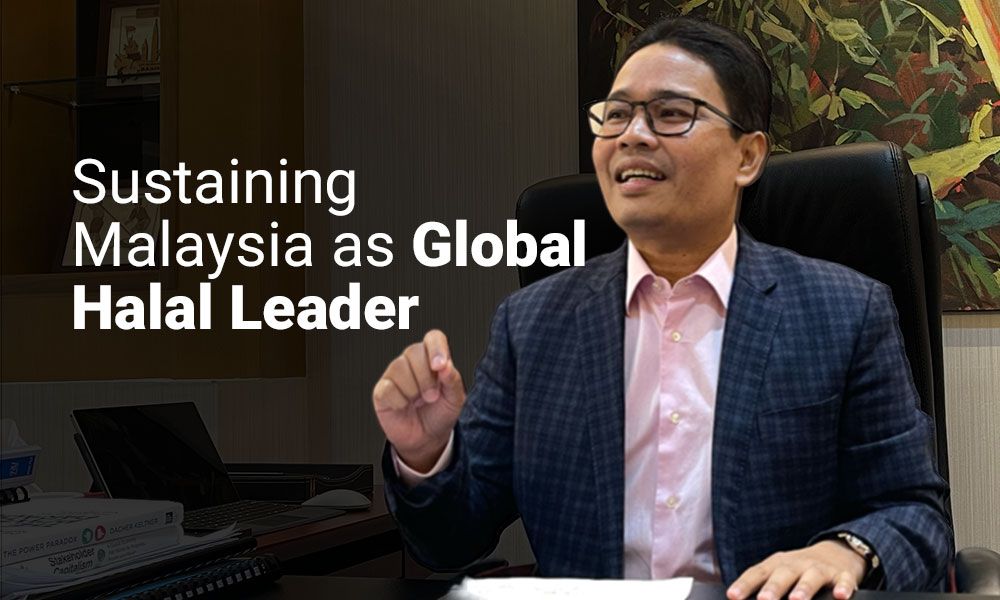Aug 21, 2023 4PM
Sustaining Malaysia as the Global Leader in the Halal Industry
When it comes to the halal industry, Malaysia stands out as a global leader. With a history dating back to the 1970s, Malaysia took early steps to establish good governance and practices in the halal ecosystem. The government's foresight and commitment to promoting the potential of the halal industry played a crucial role in positioning Malaysia at the forefront of this booming sector.
“We started this good governance and practices on halal ecosystem very much earlier in the 70s. Thanks to the awareness given by the government back then that saw the potential of the halal industry as a whole”, said Khairul Azwan Harun, Chairman of Halal Development Corporation (HDC).
HDC, under the Malaysia of Investment, Trade & Industry (MITI), has played a pivotal role in promoting the halal industry for 17 years. HDC views halal as more than just an industry; it is a value proposition that adds economic and industry development value while considering elements of Environmental, Social, and Governance (ESG).
Competitive advantages that have contributed to Malaysia's leadership in the global halal industry
Azwan mentioned that one of the key factors contributing to Malaysia's leadership in the halal industry is its population.
As of 2023, it is estimated that there are over 2.01 billion Muslims in the world which comprises 25% of the world population. In ASEAN, that’s 240 million Muslims (42% of ASEAN). With the Muslim population rapidly expanding, comes an increased demand for halal products worldwide.
“There is a heightened awareness and demand for halal products. Consumers are keen to ensure that the food and beverages they consume meet strict halal requirements. This consumer-driven demand for halal products has set a benchmark for the industry and has pushed companies to adhere to rigorous halal standards”, mentioned Azwan.
He added, “Malaysia's leadership and the respect it has earned from other nations are also evident in the wide acceptance of JAKIM’s certification. JAKIM, the halal certification authority in Malaysia, is recognized in more than 47 countries and has also recognized 84 certification bodies worldwide. This recognition not only demonstrates the credibility of Malaysia's halal standards but also reinforces its position as a global leader in the halal economy”.
Malaysia's influence extends beyond its borders. As part of the ASEAN region, Malaysia has actively promoted halal as a top priority in the trade ecosystem. The ASEAN connectivity has served as a platform to highlight the importance of halal, and this agenda continues to shape bilateral discussions between nations. The recent visits of Prime Minister, Dato’ Seri Anwar Ibrahim to countries like Thailand, Vietnam, Philippines and Indonesia further emphasized the significance of halal and its potential for collaboration. Furthermore, Tengku Dato’ Sri Utama Zafrul’s role in promoting trade has seen significant milestones achieved including in halal exports.
Obstacles that Malaysia faces in maintaining its leadership position in the halal industry
Even though Malaysia is widely renowned as a major global halal hub, there are also several challenges faced by the industry in maintaining its esteemed position.
“JAKIM plays a vital role in regulating and certifying halal products for many years. To maintain the leadership position, we recognize the need for continuous housekeeping and refinement of Malaysia's regulations and governance. This ongoing process ensures that the certification procedures remain efficient, transparent, and aligned with international standards and ease the applicants. By upholding regulatory excellence, Malaysia can strengthen halal industry players' trust and confidence globally”, said Azwan.
He also mentioned that Indonesia has become proactive in promoting a sustainable halal ecosystem in the country.
“Indonesia has emerged as a formidable player in the halal economy, showcasing its commitment to promoting halal certification and products. Rather than viewing Indonesia as a competitor, we should see this as an opportunity for healthy competition and collaboration. Recognizing the benefits of cooperation, Malaysia and Indonesia have joined forces to share knowledge, exchange best practices, and collectively elevate the standards of the halal industry in the region”, added Azwan.
While Malaysia faces these challenges, it remains resolute in maintaining its leadership position in the halal industry. By prioritizing political stability, ensuring regulatory excellence and fostering collaboration with Indonesia, Malaysia demonstrates its dedication to overcoming hurdles and driving continuous improvement in the halal ecosystem.
Proactive measures have Malaysia implemented to sustain its global leadership in the halal industry
The Malaysian government places significant emphasis on the halal industry. The establishment of the Majlis Pembangunan Industri Halal (MPIH), led by Dato Seri Dr Ahmad Zahid Hamidi, unites all 13 ministers, Chief Ministers from every state, and 30 other ministries. This collaborative approach ensures comprehensive oversight and streamlined operations across the halal ecosystem.
“In March 2023, the Malaysian government launched the Halal Industry Master Plan 2030 (HIMP 2030). At the forefront of this transformative initiative is the HDC, serving as the secretariat for the Majlis Pembangunan Industri Halal (MPIH)” mentioned Azwan.
As a part of the initiative, he also said that HDC held a nationwide tour to actively engage with religious authorities, state governments and royal institutions across the nation to foster collaboration, gather valuable input, and bridge the gaps to harmonize efforts in the halal economy.
HDC's commitment and passion extend beyond established firms, as the organization actively seeks to involve startups that can bring innovation to the halal ecosystem. Recognizing that halal encompasses more than compliance with halal and Syariah slaughtering processes, HDC encourages businesses to view halal as an integral part of ESG considerations. By incorporating halal practices, listed companies can enhance their market positioning and unlock new opportunities.
Malaysia promotes innovation and technology adoption in the halal industry
HDC is proactively addressing the challenges faced in the halal certification process, acknowledging that blame cannot be placed solely on JAKIM. To streamline the application process, HDC is exploring innovative solutions, and exciting developments are on the horizon by introducing the National Halal Digital Platform (NHDP).
“NHDP aims to revolutionise the halal application process, offering a comprehensive digital platform that ensures efficient and seamless processing. While JAKIM will remain the approving authority, NHDP will monitor and manage the entire application journey, from pre-approval to post-approval. By incorporating disruptive technologies and features, NHDP will provide applicants with tools for regulatory compliance and halal assurance, including traceability features”, claimed Azwan.
Upon approval, NHDP will make halal certification accessible and convenient for all, placing everything at the fingertips of users. Market access and management will be facilitated through the Halal Integrated Platform (HIP), a robust digital engine.
“With over 10,000 active members, HIP brings together suppliers, retailers, importers, exporters, and industry professionals worldwide. It serves as a vital platform for networking, knowledge exchange, and market expansion”, added Azwan.
HDC, mandated by MITI, is committed to exploring new markets for halal products. While focusing on Europe, Australia, Iran, and North Africa continents, HDC aims to penetrate emerging halal markets. Currently, the global halal market is valued at 3 trillion USD and Malaysia has captured 20 billion USD, accounting for a fraction of the market's total value. To bridge this gap, HDC is determined to make significant strides in market penetration.
Exciting developments are also underway as HDC prepares to launch the NHDP next year. This groundbreaking platform, currently awaiting approval from MITI and subsequent cabinet approval, will revolutionize the halal economy. Within six months of approval, the NHDP is expected to go online, providing a seamless and efficient system for halal product registration. Once approved, the implementation process will be straightforward, enabling producers to seamlessly plug and play within the platform.
The introduction of NHDP and the establishment of HIP as a digital powerhouse demonstrate Malaysia's commitment to revolutionizing the halal industry. These initiatives, coupled with HDC's efforts to expand market reach, will undoubtedly propel Malaysia closer to its goal of sustaining itself as a global leader in the halal market. With innovation and strategic planning, Malaysia is poised to harness the immense potential of the halal industry and capture a more significant share of the global market.
Future prospects and opportunities for Malaysia to further enhance its leadership in the halal industry
HDC has introduced Halal Diplomacy which aims to set global gold standards for Halal by facilitating cross-border Halal services, promoting technology and research sharing, and ensuring a seamless Halal verification process. This approach fosters a resilient and sustainable global Halal economy.
During World Halal Excellence Award 2023 (WHEA 2023) by HDC, Deputy Prime Minister mentioned that to maintain Malaysia's Top Halal status through the Internationalization of our Halal Ecosystem, HDC will collaborate with MITI and Ministry of Foreign Affairs to spearhead this agenda and achieve the desired outcomes for Halal Diplomacy.
Many countries and organisations seek inspiration from Malaysia's thriving Halal ecosystems. Now is the opportune moment to elevate Malaysia’s Halal brand and services on a global scale. A clear and cohesive Halal Diplomacy strategy, with unified efforts from all agencies and industry players, is crucial in achieving this goal. Halal Diplomacy strives to maintain Malaysia’s halal certification no. 1 ranking and to further achieve higher trades.
HDC's commitment and passion extend beyond established firms, as the organization actively seeks to involve startups that can bring innovation to the halal ecosystem. Recognizing that halal encompasses more than compliance with halal and Syariah slaughtering processes, HDC encourages businesses to view halal as an integral part of Environmental, Social, and Governance (ESG) considerations. By incorporating halal practices, listed companies can enhance their market positioning and unlock new opportunities.
“Halal is not limited to the Muslim community. It is a concept that everyone can explore, experience, and embrace. The participation of non-Muslims is vital in fostering diversity and driving the growth of the halal industry. While it may be a concern to some that only 38% of the 8,000 halal-certified companies are Muslim or Bumiputera, it is important to emphasize that halal is for everyone. However, for those within the Bumiputera and Malay communities, their involvement is crucial, as they can benefit from government funds and support. Developing their own products will be key to fully harnessing these opportunities”, said Azwan.
The halal ecosystem is a symbiotic network, where each participant plays a vital role based on their expertise and responsibilities. It is crucial to recognize that halal extends beyond a single industry—it is an ecosystem that touches various sectors, including logistics, tourism, fashion, finance, and more.
Azwan added that with the ambitious vision of HIMP 2023 and the active engagement of HDC, Malaysia is poised to drive the halal economy to new heights. By nurturing collaboration, embracing innovation, and viewing halal as an inclusive ecosystem, the nation is paving the way for a thriving and globally recognized halal market.
Halal able to make a difference in income inequality
As a net importer of food, Malaysia's focus has primarily been on meeting domestic market demand. However, with an abundance of companies, especially SMEs, capable of producing high-quality halal products, the Halal Development Corporation (HDC) aims to connect them with the expanding global and domestic halal markets.
“HDC recognizes the immense potential of local companies and seeks to leverage their capabilities. By providing support and guidance, HDC plays a pivotal role in taking these companies to new heights and helping them tap into the burgeoning halal market. With a commitment to nurturing homegrown talent, HDC envisions a future where Malaysian halal producers thrive on a global scale”, said Azwan.
While the global market presents vast opportunities, HDC acknowledges that venturing beyond borders may seem daunting for some companies. In such cases, HDC encourages businesses to focus on regional markets first, particularly within ASEAN. By targeting nearby countries, HDC aims to bridge the gap and gradually expand its market reach. This strategic approach allows companies to gain valuable experience and confidence before venturing into more distant markets.
“With the support of HDC and the upcoming launch of the NHDP, Malaysian halal producers are poised to seize new opportunities. The expanding global and domestic halal markets offer a promising avenue for growth and success. HDC's commitment to empowering local companies and streamlining market access creates an environment where Malaysian producers can thrive, contributing to the nation's halal industry and enhancing its global reputation”, said Azwan.
Halal is also beneficial to non-business individuals. In line with JAKIM's policies, manufacturing companies seeking halal certification must have dedicated a halal unit with a minimum of 2 halal executives. HDC, as the industry-leading body, is mandated to train halal professionals, executives, and auditors.
“At the HDC training center, individuals with relevant work experience can receive comprehensive training and join halal-certified companies by JAKIM. Furthermore, acquiring halal training brings added incentives, including potential salary increments”, mentioned Azwan.
With HDC’s commitment to empowering startups and providing extensive halal training, the halal economy is set to flourish. By bridging the gap between innovative ideas and market penetration, HDC contributes to the growth and success of the halal ecosystem, while equipping individuals with the necessary skills to excel in the industry.
Recently, Azwan mentioned that HDC also aims to be given the mandate in handling the halal certification for new export items. HDC seeks to further deliberate with MITI and JAKIM to define this role, focusing on the F&B manufacturing sector. This aims to ease JAKIM's workload, speed up certification, and boost halal exports towards the RM300 billion 2030 target.
Waktu Solat



17 Feb 2026
Waktu solat berikutnya,
Maghrib
pada
19:29




















